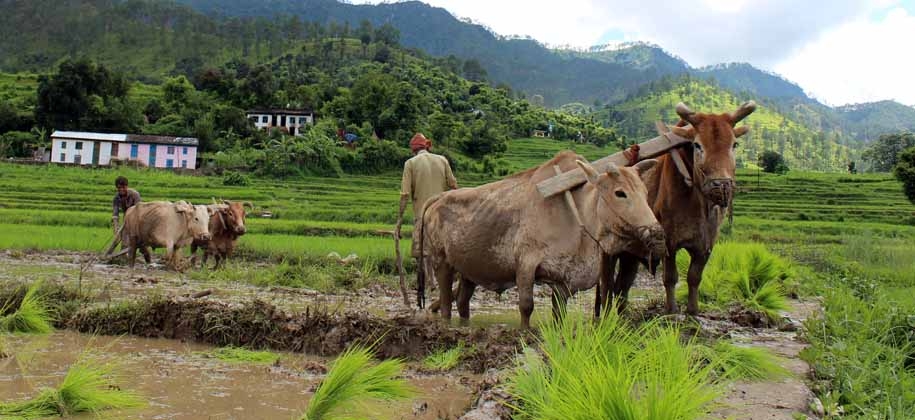Edible oils constitute a very important part of the food of any country as most food is eaten in cooked form and in most cooking to some extent at least some edible oils are used. Most of the traditional oilseeds which provide the base for edible oils are also important sources of nutrition in themselves, apart for their use as essential cooking medium. However excessive use of edible oils beyond real needs can be harmful and one should also caution against those forms of heavy processing, such as hydrogenation, which turn highly benficial food products into harmful ones.
India is in a fortunate state of being home to many oilseeds. These include groundnut, mustard, sesame of course, but in addition there are several others in smaller areas but with highly valued food and even medicinal virtues. For example several hilly and tribal areas can have their own special oilseeds and oils. Livelihoods of millons of oilseed farmers are linked to growing these traditional oilseeds for which they have special skills and knowledge. Cultivation of these traditional livelihoods goes back a very long time and hence is linked to well-developed mixed farming and crop-rotation systems, as also to local soil, water and weather conditions.
Cottonseed is another important oilseed which becomes available as an additional product. Coconut too is a very valuable source of edible oils in some parts of the country. Another strength is that people value desi ghee or clarified butter as a good cooking medium.
Apart from their use as edible oils, these plants provide very healthy food in the form of nuts, leaves, seeds etc. which can be eaten directly or used in various high nutrition products admired much for their flavor and taste. Coconut water is much relished as a nutritious refreshing drink. Certain types of dishes, snacks or sweets are best cooked in a certain type of oil or ghee. After extracting oil, farm and dairy animals get residue oilcakes as the most important concentrate feed.
A typical Indian household has many important uses for edible oils other than as food. Mustard oil is much favored for massage and several medicinal uses which for some persons may be more essential than edible uses.
Another important aspect of the oilseeds scene in India is that rich skills have been available for local, even village-level processing of traditional oilseeds. Several occuptional groups known by diverse names have been associated with this work using traditional skills and equipment. This can yield pure oil whose nutrition and medicinal qualities are higher than the oil extracted in big industrial units. Local processing makes it possible for residues to become available for farm and dairy animals within the village. Desi ghee can be prepared at the level of any household. The process of converting milk into ghee yields chaach as a residual by-product which is a good source of protein often distributed free in villages.
This rich heritage can be improved in several ways to meet the growing needs of edible oils. Unfortunatey distorted priorities pursued by big business interests acting often in collussion with governments have instead harmed this heritage in several ways.
Hydrogenation of oil in big business units led to mixing up of diverse sources of fats to provide an unhealthy cooking medium which was cheaper and hence harmed the prospects of traditional farmers and processors who wanted to sell pure healthy oil. Imports of cheap oils increased these problems. Very high power ( although not yet successful) efforts to introduce genetically modified mustard were made and unlabelled soyabean GM oil was allegedly imported, increasing health risks greatly. Moves to fortify edible oils further pushed the sector towards domination by big business processing.
Finally, in 2021 the Government of India announced more openly and emphatically its intentions of pushing a strategy of increasing edible oils supply which would be led by palm oil. Rapid spread of palm oil fruit trees in ecologically sensitive regions like the North East states and the Andaman Nicobar Islands can be very harmful for their environment, bio-diversity and food security but in addition this can also be very harmful for traditional oilseeds in the entire country. Once the domination of the cheaper palm oil in the market pushes down the overall price level in the edible oils market and government funds also prioritize palm oil, the prospects of traditional oilseeds and farmers growing them will deteriorate further, in addition to the difficulties faced by them already in recent times. Apart from the government efforts to spread palm oil with the help of favoured companies, the big business lobbying with the government to spread GM crops in the oilseeds sector is also continuing.
Clearly the traditional oilseeds and the farmers growing them as well as local small-scale processors are being pushed towards very serious threats. These threats should be recognized and resisted. Now is the time to stand up to save traditional oilseeds, their farmers and processors. Tomorrow may be too late, as the threats are spreading very fast.
Bharat Dogra is Convener, Save the Earth Now Campaign. His recent books include Man over Machine ( Gandhian Ideas for Our Times ) and Planet in Peril.













